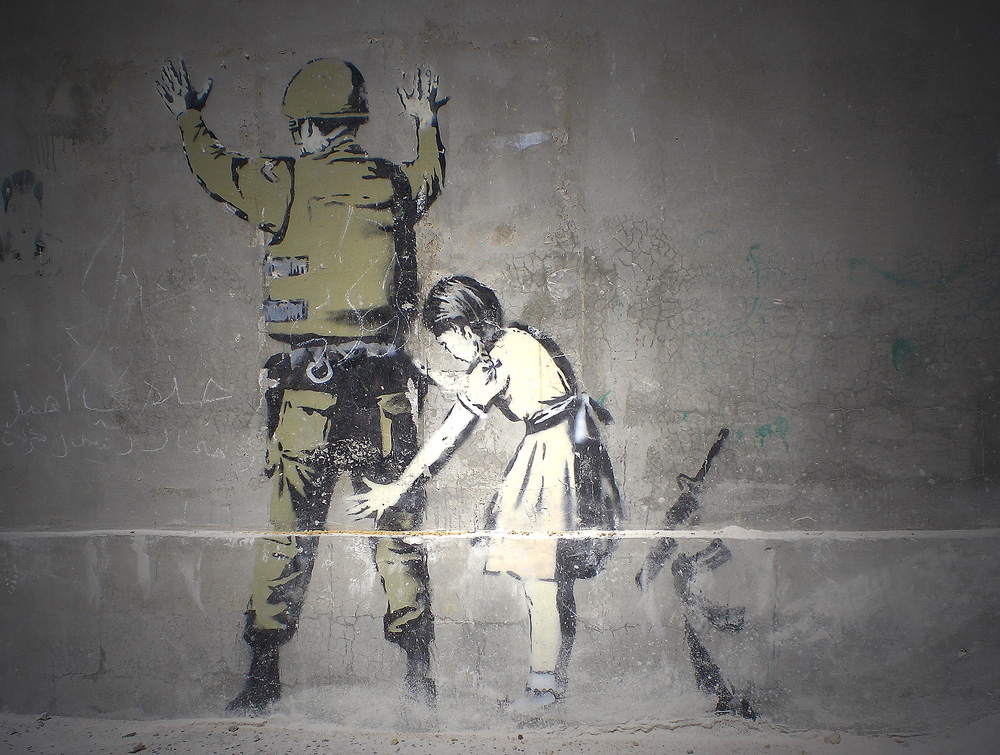Kalandia – A Checkpoint Story is the title of an observational documentary by Israeli activist Neta Efrony, from the Israeli women´s movement, which deals with maintaining the human rights of Palestinians at Israeli army checkpoints. Efrony´s documentary captures the seven-year development of one of the 400 checkpoints in the West Bank, called Kalandia. Kalandia checkpoint is located in the northernmost part of East Jerusalem (southwest of Ramallah) and is the place through which one must go through to get from the West Bank to occupied East Jerusalem, paradoxically the Capital and heart of an autonomous Palestinian state. The author brilliantly captures how a small ´temporary´ military post (in 2001), created in order to maintain security, and became a huge terminal by 2008. She spent seven years filming the ordinary lives of hundreds of people in an extraordinary place, the Kalandia Checkpoint. You will see the daily lives of Palestinians waiting for hours in long, crowded queues, where, at the end they will find the entry to their work, schools, hospitals and houses of prayer. The life that depends on the decisions of the Israeli army is literally changing from hour to hour and their lives continue, day by day, in this way.

The film Kalandia – A Checkpoint Story
The film Kalandia – A Checkpoint Story was screened at the festival One World in 2010. The One World festival is organized by the non-profit organization People in Need. The people featured in this documentary are not only in need, but in an unresolvable situation. Israel, after winning the Six day war, annexed the West bank, including East Jerusalem. On the West bank, a number of Israeli settlements were built during the 1970s and after the withdrawal of Israeli troops these settlements remained a serious issue, and today their number is still increasing. Israel did not give up East Jerusalem, which should have been the capital of a future Palestinian state, and is still occupied.
Kalandia – A Checkpoint Story – 10 minutes trailer
On the grounds of protection and security measures, checkpoints were established at about 400 Israeli controlled crossings around East Jerusalem. Not only for the Palestinians, but also for tourists, it has become virtually impossible to travel freely in Palestinian territory or to travel from one city to another (I draw from my own experience). The only way out is the way to Jerusalem, where the buses go to certain cities – but you must still pass through checkpoints. The Palestinian territory has become a mere tangle of independent Palestinian cities, surrounded by desert, Israeli settlements and Israeli checkpoints. You are exposed to a lengthy security process and travelling between towns situated just a few kilometres from each other can take several hours (if not a full day). If you are a Palestinian and you need to get to work at the schools, universities or, during public holidays, to the al-Aqsa mosque, you need Israeli permits. Even if you get it, you still may not be successful.
The Israeli army receive orders which change from hour to hour and, every day only some of the Palestinians can pass (those with allowances). On the first day it might only be men over 30 years, the second day, those over 50, on the third day no one at all and on the fourth day, it is empty, without a military checkpoint. This is not a joke, but the reality of life at the checkpoints for Palestinians. Another huge problem is the young soldiers at checkpoint serving mandatory military service. They themselves are so nervous and often solve stressful situations through applying some force. Nervousness is present on both sides. What is the problem? Completely uncoordinated checkpoints and arbitrary decisions by soldiers. People waiting in line for hours suddenly find that they cannot pass. The demotivation and sadness leads to anger and aggression directed at the soldiers. My personal opinion about this problem is very pessimistic, because the only solution for this situation is the withdrawal of Israeli troops from East Jerusalem and the Israeli settlements that surround it. I think that, despite the international pressure, it will never happen – and this documentary will be a mere expression of sorrow and injustice faced by Palestinians.
Conclusion
My emotional reaction to this movie was deep. I felt a deep empathy and sadness over the impasse. The saddest scene was a shot of people lighting candles on the grave of children who had thrown stones over the fence at Israeli soldiers and were shot. Another situation, which really touched me, was a scene with a man of about 40 years old, when he asks the soldiers ´Why can´t I pass? I must go to work!´ After the question, he is upset, he does not know why, he has an allowance – then he covers his face with his hands and he cries into them.
In this documentary I found two new pieces of information. There are over 400 Checkpoints, which seem an absurdity for such a small territory. The second fact is the uncoordinated control over the checkpoints. I used to think that the Israeli army has some kind of order, or list, or anything where I can see something logical. When I personally visited Palestine, somehow I did not feel like a tourist, I saw how big a problem the checkpoints for Palestinians are. I could always pass. After seeing the documentary, I realized that these people must live there and deal with absurd orders that prevent them from living an ordinary life – the life of a teacher, a schoolchild, a muslim and a human.